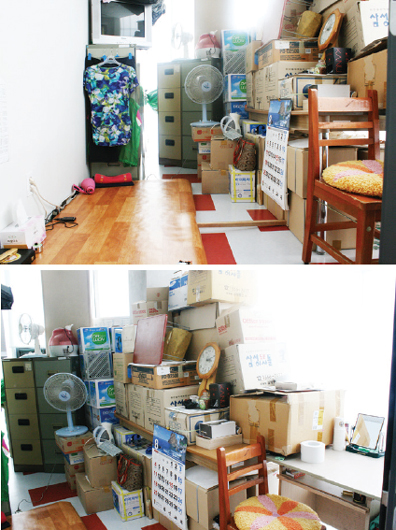
Has anyone wondered where these janitors rest? Although staff lounges only for janitors to relax do exist, janitors of the University of Seoul are now calling for more comfortable staff lounges. They are also regularly picketing in front of the University Center for various reasons, constantly protesting and handing printouts to students.
Since the students of UOS are quite often oblivious of the janitors’ efforts and situation, The UOS Times covered in depth about the reality of their situation for this volume of the magazine.
The UOS Times first interviewed an anonymous janitor from our school and the labor union leader, Yoon Se-hyeon to learn about the situation janitors are in. Based on interviews with each person, we learned general knowledge about UOS janitors.
What UOS Janitors do
According to UOS janitors, there are 63 of them who work at UOS in total. In principle, janitors work from 7 a.m. to 4 p.m. on weekdays. They have meal times and a one-hour break between 11 a.m. to 12 p.m. Generally three janitors are assigned per one building, but up to seven people can be arranged depending on the size of the building. They are assigned randomly but there is a regular annual switch between janitors. Therefore, the building assignments are fair for everyone. For this reason, although janitors who work in the Main Library have much more work to do ? because the Main Library is frequented by UOS students the most ? they do not complain that much. In each building, both male and female janitors are assigned equally.
Janitors do different kinds of work based on gender. Usually female janitors are in charge of both men and women bathrooms while male janitors do a lot more of the other work than the females. The kinds of work male janitors do range from indoor cleaning to outdoor cleaning. They deal with trash - the trash on the streets outside of the campus as well as the trash all over the campus -repair broken things and sometimes clean the professors’ or department offices. In the case of male janitors, there are no fixed tasks because they actually do all the things they can whether the tasks are on campus or not.
While we talked further about the janitors’ working environment, The UOS Times also found that UOS janitors are working in poor conditions.

Poor Working Conditions that UOS Janitors are Now Facing
As we mentioned above, UOS janitors are now calling for comfortable staff lounges. Leaving the work itself aside, it is hard for janitors to get good rest, which altogether adds up to work stress. Although staff lounges for janitors do exist, they are not equipped well. They are a lot different from those for the students in that there is even no table or chair. According to the union leader, Yoon, once he gathered abandoned tables to equip a staff lounge.
In addition, most of the staff lounges are unisex. Because of this, when they change their clothes ? prior to and after work ? male and female janitors must wait until the other parties are fully clothed. That is not all. The room itself is very narrow as well and most of the staff lounges UOS gave to all the janitors are in the MDF room or the cellar. Because of the confined space and limited chairs, male janitors inevitably have to rest outdoors, in order to be considerate of female janitors. Therefore, especially in the summer, male janitors do not feel rested under the hot sun. In these respects, they hope that UOS will make the lounges separated by gender and offer basic things such as tables and chairs.
To make matters worse, another pressing and troublesome problem arose. This is the reduction of the age limit. According to Yoon, the labor union of UOS began protesting first due to the tyranny of the service company; some examples of this are high commissions taken from wages, violent supervisors, overtime work that was not assigned to the laborers and so on. In opposition to unjust treatment, the labor union was created on Oct. 12, 2012, in the hopes that having the university directly hire the janitors would ensure just treatment. Consequently UOS hired the janitors directly on Mar. 2, 2013.
When a direct hiring system was put into practice, another problem occurred. Before the labor union of UOS was created, janitors did not have any problems with being too old for the job since they were hired from a service company. However, since they are now hired directly by UOS, this means that they are considered semi-civic servants ? a semi-civic servant is a coined phrase that refers to paid workers who help civil servants. They are more civilians than civil servants ? but they are under the retirement age law of Seoul due to the fact that UOS is a public university funded by the city of Seoul. In principle, they have to retire at the age of 65 regardless of their physical condition.
Under the present conditions, the retirement age problem is the touchiest for janitors. This is because about 40 percent of UOS janitors are already beyond the retirement age of 65 and the other 60 percent are near 65 which are also influenced by the law. Therefore, in 2015, 40 percent of the janitors will lose their jobs unconditionally, and current janitors will continuously lose their cleaning jobs annually.

Labor Union
Besides the retirement issue, the labor union members elaborated on a few more things for which they are fighting.
Mr. Yoon said not only UOS janitors but also other janitors share the same difficulties.
For example, Seokyung Transportation and 120 Seoul Call Center workers are also struggling under uncomfortable working conditions. UOS janitors are actively participating in protests for further enhancement of these workers like them as well. The labor unions joined the Seoul Public Service Union together and continue to take part in protests and meetings.
However, during this process, UOS cut the wages of the members who participated in the protests. In a statement UOS janitors received, there was no explanation other than ‘etc’ on a reason for cutbacks. In this regard, Yoon contended, “Since UOS accepted the labor union, it should be tolerable for the workers to participate in the union activities. Cutting wages and reporting it to janitors as ‘etc’ was certainly an incomprehensible conduct to all of us.”
The UOS labor union is currently striving to negotiate with the administration office for enhanced working conditions for all janitors. Every Wednesday at 11 a.m. the labor union members and school officials gather around for a weekly negotiation meeting in front of the University Center. Up until now, they have negotiated about 74 articles and have not finished yet. All of a sudden, the school hired a certified labor attorney and told the janitors that all the negotiation articles made so far need to be confirmed from the scratch. The labor union that participated in the meetings and thought all the negotiations had been already confirmed as effective, was dumbfounded by this notification.
The Office of General Administration is in charge of the labor issue of the janitors. The related officer who dealt with the labor union gave a thorough explanation for the questions the janitors had.
These are explanations for the questions the janitors had. The UOS’s position on the janitors’ case is as follows.
The first is about the retirement age problem. According to the officer, UOS plans to deal with this problem by supporting retiring janitors in 2015 in other ways. The university is well aware that all the janitors are healthy and capable of continuing to work at UOS. However, the retirement policy was not made by the university. It was originally decided by the City Hall of Seoul under the current mayor, Park Won-soon. An extension can hardly be made at this point unless the city of Seoul changes its whole policy. Therefore UOS cannot put off the janitors’ retirement at will. Instead, it is preparing a post-retirement plan for the janitors who will be forced to retire. Along with ‘Seoul Job Plus,’ UOS is trying to provide related possible jobs to the retired workers. This has been set from Dec. 7, 2012.
The second is about the wage cuts of the members. UOS accepts the labor union and their willingness and demonstrations. However, the university clearly separates the work and the labor union activities. UOS does not pay for the hours when an employee does not work during the working hours. Concerning the ‘etc’ column on the pay statements, officers are not allowed to simply write down ‘labor union protest’ as a cutback reason on UOS principle. All the extra reasons for the cutbacks are unexceptionally sectioned as ‘etc.’ This applies not only to union activities but also to all UOS official documentation.
The last part is about hiring a certified labor attorney and starting finished negotiations from the scratch again. As The UOS Times mentioned above, the labor union believes that all the negotiated articles have become invalid. However, the officer insists UOS did not make the articles invalid at all. The reason for hiring the attorney was that the university lacks professional knowledge about the labor issues. The certified labor attorney was hired in July for better negotiations and understanding.
University of Seoul
Based on interviews with both sides, there seems to have been a mistake between them. At present, the negotiations are still under supervision. When the university announced the new confirmation, it meant to make the negotiations real and effective. The labor union has signed the minutes just for postponement of the confirmation. Thus, further adjustment is considered possible. The university cannot agree to all the conditions for which the union is asking for. UOS also needs adjustment in the negotiations. The confirmation is not ready yet. It still needs changes and what UOS wants to achieve is the same as what the union wants: an agreement between the union and the university as soon as possible.
The UOS Times additionally interviewed the former student vice president to learn more about the janitor-related situation in 2012. He talked specifically about what students did to help the janitors
This is a story from the former vice-president: what students did for the janitors in 2012
Last year, before the labor union was formed, the ex-Student Council gave diverse efforts for the laborers. During a snack event ? UOS held a snack event during the examination period to encourage exhausted students ? it spared some snacks for working janitors. In addition, when the Student Council held an ‘After School Computer Class’ for local residents, it arranged the lecture time at 4 p.m. This was specially arranged for the janitors because they finish their work at 4 p.m. The Student Council wanted the UOS janitors to enjoy the benefits because they work for UOS. Student Solitary was also another student group that helped the labor union. It directed a signature-collecting campaign for three weeks to support and help the laborers, which gained more than 1,000 signatures from UOS students.
Additionally, the former vice-president took part in a series of demonstrations together with the UOS janitors. He said, “In my case, I was just there for them whenever they had a protest or spoke with the chancellor.” It may be difficult for university students to help these laborers as directly as he could. Therefore, he suggested other methods to help them. “Instead, UOS students can cheer up the janitors by just knowing what hardships they go through. They will be glad that students know what is going on. I want to ask the UOS students to take interest in the situation the janitors are in.”

"A Little Interest Can Help"
An anonymous janitor said, “Even a small interest can help janitors.”
As he suggested, a little interest can boost the janitors’ energy. Actually, an anonymous janitor wanted to give thanks to UOS students through our magazine. According to her, whenever she was exhausted, UOS students became a comfort to her. When she cleans the bathrooms, she always exchanges greetings with them and their smiling faces lift her mood. The other day when she had to move to another building ? janitors regularly switch buildings of responsibility with one another ? some disappointed students hugged her. She was impressed by their affection and that made her work more responsibly for a clean campus. Also, she worked more cheerfully to earn their favor.
Since you have read through this, look around for the janitors on campus yourself. They are probably cleaning the bathrooms and streets, dealing with the trash you dumped, or taking a humble rest in a confined room. Some students may overhear their shouting voices, calling for just treatment near the University Center. At the sight of these conflicts between UOS and the janitors, The UOS Times hope for an amicable settlement to all matters related to the UOS janitors. And lastly, UOS students need to pay attention to this problem carefully and take a lasting interest in the janitors’ situation since it is related to their campus life directly.
All photos credited by Jang Ye-sol
Kim Hye-ryung Vice Editor-in-Chief
parisienne314@uos.ac.kr
Jang Ye-sol Junior Reporter
yesol94@uos.ac.kr

